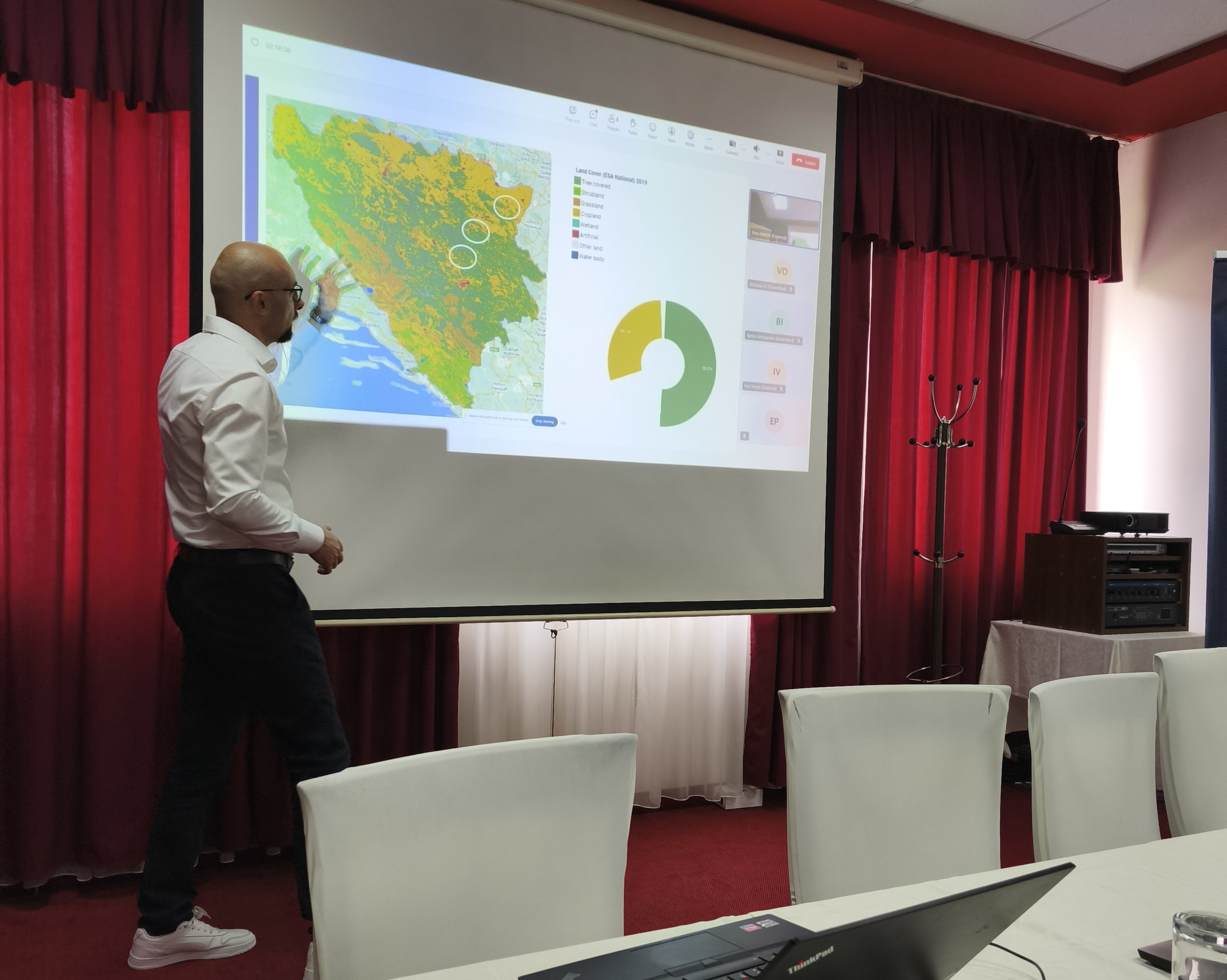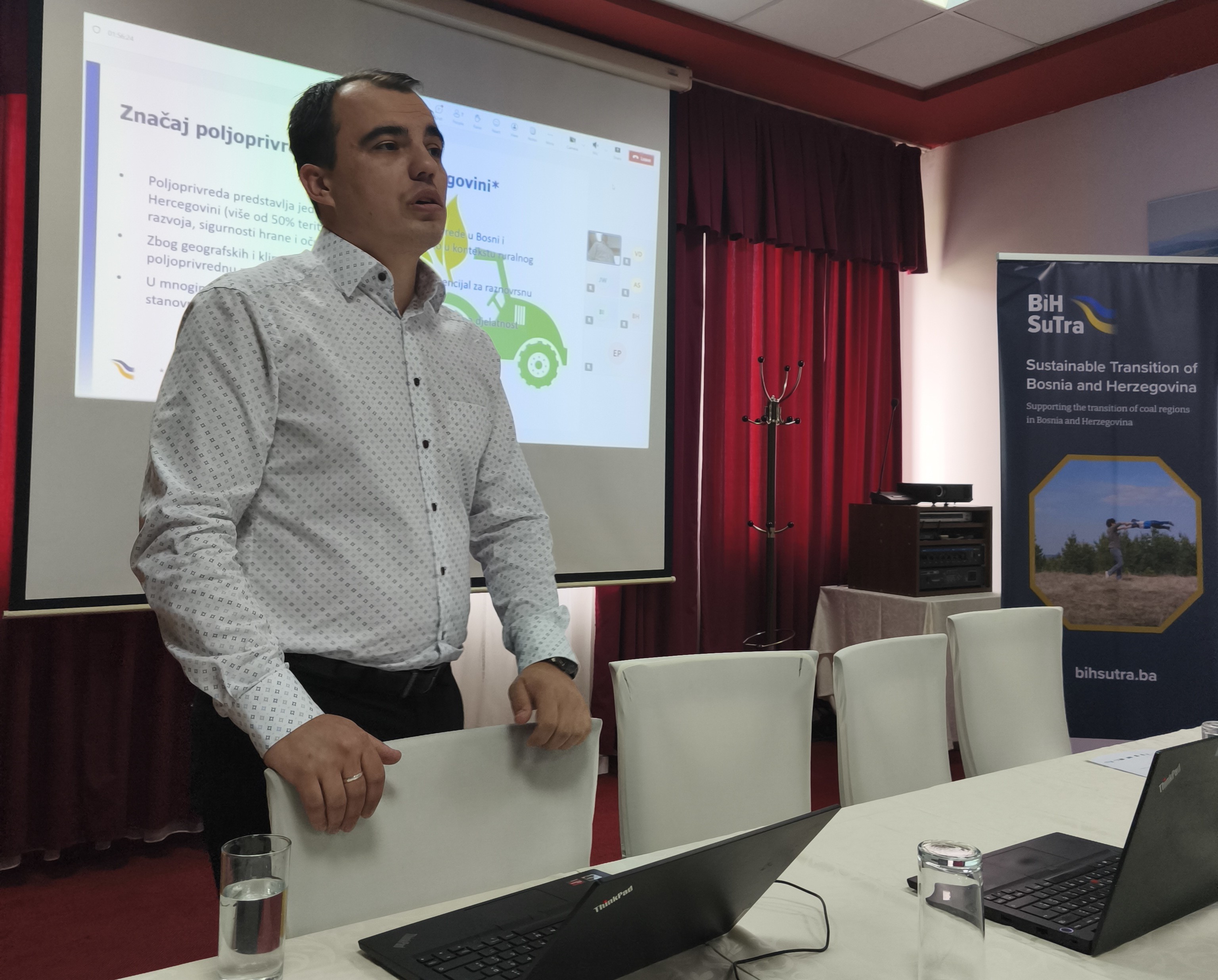 Photo: With courtesy of Prof. Dr. Sabrija Čadro.
Photo: With courtesy of Prof. Dr. Sabrija Čadro.
 Photo: With courtesy of Prof. Dr. Sabrija Čadro.
Photo: With courtesy of Prof. Dr. Sabrija Čadro.
How can municipal authorities in Bosnia and Herzegovina navigate climate pressures, EU policies and on-the-ground innovations to foster resilient farming? This blog post is written by BiH agriculture experts, Prof. Dr. Sabrija Čadro and Samir Husić, MA, engaged in the BiH SuTra project.
As part of the project, Stockholm Environment Institute (SEI) convened a one-day workshop in Ugljevik on 17 June 2025, bringing together important agriculture stakeholders. Hosted at Hotel Atlas, the event aimed to bolster the technical know-how and institutional frameworks of local administrations in promoting sustainable agriculture.


As participants, we were struck by the enthusiasm around translating high-level strategies into concrete actions on the ground, particularly at a time when Bosnia and Herzegovina (BiH) struggle with both the challenges of climate change and the prospects of EU integration. This was not just another formal gathering. It was a collaborative forum where practical knowledge and creative insights met – from Swedish farms to Bosnian valleys.
.jpg)
More than an industry – a lifeline for societies
Agriculture is more than just an economic sector, it's a way of life, the foundation of food security, rural livelihoods, and ecological balance. Coincidentally, this workshop took place on June 17th, the World Day to Combat Desertification and Drought. It was a timely reminder of the urgent need to protect our soils. Soil is not just a substrate for crops, it is a vital reservoir of carbon, a regulator of water cycles, and a cornerstone of biodiversity, its protection is inseparable from climate resilience and sustainable agriculture. Today, farmers worldwide face unprecedented challenges: climate extremes, soil degradation, and socioeconomic pressures that threaten farming’s existence. Bosnia and Herzegovina is not an exception, nevertheless these problems are even more pressing.
.jpg)
Without adaptation and reduction of vulnerability, these issues will escalate into crisis, further increasing dependence on food imports, especially in the context of rural depopulation and land abandonment. Imagine farms where sensors measure soil moisture in real time, drones not only monitor crop health but also apply treatments and fertilizers precisely at the right place and time, and artificial intelligence predicts pest outbreaks before they occur, autonomous machines perform agricultural tasks, all working together as an integrated decision-making system. This isn't science fiction, these are technologies already in use today. For agriculture, adopting these innovations isn't a luxury anymore, soon it will become a matter of survival. Precision irrigation can reduce water use by 50% during droughts. Digital platforms connect small producers directly to markets, bypassing middlemen. Soil quality monitoring prevents erosion, preserving fertile land for future generations. Without these advances, farmers remain trapped in a vicious cycle, fighting climate change with last century's tools.
In BiH, farmers can begin taking small but significant steps toward adopting these innovations. A practical first step would be for farmers to participate in training programs offered by academic institutions or international NGOs and donor organizations in BiH. These programs can help build knowledge on modern agricultural practices, technology adoption, and sustainable farming techniques. Farmers could start by implementing low-cost technologies, such as soil moisture sensors or using online platforms for market access, to test the benefits before investing in more expensive solutions. In the case of smaller farms, forming cooperative groups could help reduce costs by sharing technologies, providing educational opportunities, and employing agronomists for technical support. Of course, this transition must be supported by appropriate policies that promote innovation and provide incentives for sustainable practices.
From local challenges to European solutions
We provided a brief overview of the challenges facing agriculture in BiH to the participants at this training event. We talked about how we see increasingly frequent droughts, floods, and extreme temperatures, along with soil degradation and declining fertility. Fragmented land holdings, an aging rural population, and limited market access further hinder development. As highlighted, “without coordinated interventions tailored to local needs, producers will be left behind.” Coordinated interventions in agriculture in BiH have already seen positive results through collaboration between academic institutions, private companies, and government bodies. For example, the Faculty of Agriculture in Banja Luka and the Faculty of Agriculture and Food Sciences in Sarajevo are involved in EU-funded projects that promote modern agricultural practices, such as automated irrigation systems, use of remote sensing and soil health monitoring. In the private sector, AgroHerc Organic in Gabela is integrating smart irrigation and drone technology to enhance the efficiency of organic farming. Additionally, local initiatives like water user associations in Trebinje have successfully improved water management and resource-sharing among farmers. Government support is evident in investments in irrigation infrastructure, anti-hail networks, and policies aligned with EU Land Degradation Neutrality (LDN) goals.
Jonna Wiklund, SEI expert, presented key EU regulations (the Nitrate Directive, the Restoration Law, and the Soil Monitoring Law) and the Common Agricultural Policy (CAP) 2023–2027 framework, emphasizing eco-schemes, agri-environmental payments, and incentives for precision technologies. Drawing on the Swedish example, she illustrated how targeted subsidies for cover crops, nutrient management, and buffer zones significantly improve soil health and biodiversity. Jonna emphasized that digital tools and advisory services can simplify access to these funds, which sparked strong interest among participants. The diversity of perspectives was one of the workshop’s greatest strengths. Farmers, agronomists and local government administrative workers debated side by side with EU-policy specialists. This exchange of ideas brought fresh energy to the room and made complex topics like understanding EU rules and building advisory networks easier to understand and embrace.
By the afternoon, the focus shifted to concrete pilot initiatives. SEI expert, Ivar Virgin, showcased the use of precision fertilization sensors, controlled traffic farming, and satellite-based decision support systems in Sweden. He presented the example of the Ova Växt AB cooperative, which leases 800 hectares of land and reinvests CAP Pillar II funding into carbon sequestration and biodiversity-friendly field margins. Drawing on the Swedish example of cooperative land management, participants began to understand the benefits of shared equipment pools and joint processing facilities.
Call to Action: Time for your community to innovate
The message is clear: holding on to old agricultural methods means losing our future. Adopting technology doesn't mean abandoning tradition, it means modernizing to preserve it. Every workshop, every pilot project, every dialogue plants seed of resilience.
The workshop’s collaborative format fostered lively exchanges. This event reaffirmed that sustainable agriculture in Bosnia and Herzegovina hinges on empowered local governments, armed with the right policies, partnerships and technologies. We are now looking ahead to the next BiH SuTra capacity-building sessions. In the meantime, we invite all readers, municipal staff, farmers’ associations and civil society to share your insights and pilot ideas. Do you see opportunities for your municipality to adopt precision farming, eco-schemes or collaborative service models? Write to us and let’s continue shaping a resilient agricultural future together.
Photos used are from the archive of Prof. Dr. Sabrija Čadro.
Discover the News and Updates section, delivering the latest updates and insightful content across various topics. Stay informed with most recent news articles, reports, and publications, of the BiH SuTra project.